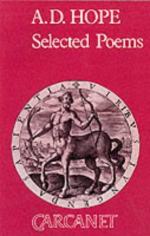|
This section contains 4,710 words (approx. 16 pages at 300 words per page) |

|
SOURCE: Bowers, Neal. “Form as Substance in the Poetry of A. D. Hope.” Shenandoah 44, no. 1 (spring 1994): 68-80.
In the following essay, Bowers contends that the defining characteristics of Hope's poetry—particularly his reliance on conventional forms and his rejection of modernism—have now come back into vogue in literary circles.
To identify A. D. Hope as an Australian poet and strict formalist is to employ terms he might well reject, the first on the grounds that true poetry transcends national boundaries, the second because it is redundant. In Hope's world, poetry is its own domain, and any poem lacking meter and rhyme is a mere sham. In an age when writers have eagerly indulged in chauvinism and free-form experimentation, such sentiments as Hope's seem decidedly old fashioned, even reactionary. Indeed, in Hope's own country, his almost total lack of interest in anything overtly Australian has disappointed some critics...
|
This section contains 4,710 words (approx. 16 pages at 300 words per page) |

|


